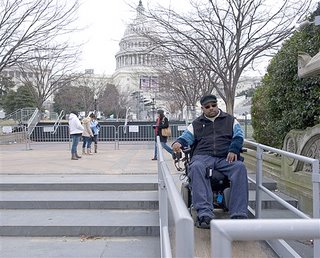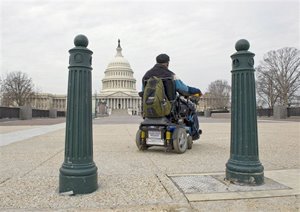Disabilities become big challenge for inauguration

By Gillian Gaynair
Associated Press Writer
WASHINGTON — Bob Coward rolls along the U.S. Capitol grounds, speeding up as he nears a set of port-a-potties set up for the throngs of visitors on Inauguration Day.
To his relief, he spots the wheelchair ramp. "OK, OK, we're good," said Coward, spokesman for the Washington-area's ADAPT, a disability advocacy group. "I can use the bathroom."
Coward's test run from the Capitol to the Lincoln Memorial last weekend provided him an early glimpse of the challenges he and other people with disabilities could face next Tuesday, when President-elect Barack Obama is sworn in. And he saw a few things that caused concern: There were missing curb cuts on some sidewalks. A cable line cover caused him to pitch dangerously forward in his chair as he crossed. And as workers mounted viewing stands on Pennsylvania Avenue, he wondered where the elevated platforms would be for people like him.
Some people with disabilities already are feeling discouraged by warnings of record crowds of 1 million or more and unprecedented security that will wall off much of downtown Washington, severely limiting parking and other transportation options normally available to them.
"I'm very deterred and concerned about access issues," said Coward, 44. "I don't want to get there and get disappointed and create a one-man demonstration."
and concerned about access issues," said Coward, 44. "I don't want to get there and get disappointed and create a one-man demonstration."
Organizers say it is not possible to estimate how many people with disabilities will attend inaugural festivities. But they and advocates predict there will be more than at previous inaugurations, partly because Obama's inclusive message has appealed to people of all walks of life. The ranks of visitors with disabilities are likely to include some older African Americans who have waited generations to see the country's first black president.
"At every event that the (Obama) campaign did during the election, we wanted to be sure to be welcoming to Americans with disabilities, so this is certainly not something new for us," said Kevin Griffis, a spokesman for the Presidential Inaugural Committee. "I think just the scale is perhaps larger."
But along with the invitations have come words of caution. Inaugural planners have stressed how difficult it will be for everyone — not just disabled people — to get into Washington and maneuver around the city. There will be long waits on the roads, trains and buses, followed by hours of waiting in the cold.
Obama reiterated that in a statement on Wednesday, but also urged Americans to get involved in different ways — and different cities — if they don't want to brave the crowds.
"What we're trying to do is paint a realistic picture," said Carole Florman, a spokeswoman for the Joint Congressional Committee on Inaugural Ceremonies, which plans the swearing-in ceremony at the Capitol. "It's not a matter of being discouraging or encouraging."
Mike Reynolds of Lewiston, Maine, said it's going to be difficult, "if not impossible," for him to get around on Inauguration Day.
Reynolds, 35, plans to travel by bus or train to attend a first-ever Disability Power & Pride Inaugural Ball on Jan. 18, and hopes to get close to the swearing-in ceremony, too.
But Reynolds, who has cerebral palsy, always travels with a backpack to carry prescription drugs, adult diapers and sometimes, a catheter. "No backpacks will be allowed," he said. "That's basically telling people with a serious disability issue that you're not allowed."
For Luther Smith, coming to the inauguration will probably mean a same-day trip from his home in Villanova, Pa. He's one of the original Tuskegee Airmen invited to attend Obama's swearing-in, and he's determined to be part of the historic day.
He and the other men are scheduled to meet at Bolling Air Force Base on Jan. 20, and then be transported on charter buses to the Capitol, according to a spokeswoman with Tuskegee Airman Inc., in Arlington, Va.
Smith said the only thing that would stop him is rain, snow or freezing temperatures. "I'm 88, but it's not going to be easy for anybody," said Smith, who uses a wheelchair and said he's been hospitalized for a year.
"If it's possible for me to be there, I'm going to be there," he said.
In planning for older folks and people with disabilities, the two inaugural committees have tapped into experts on accessibility issues.
At the Capitol, there will be drop-off points with waiting golf carts for people with disabilities, although they'll probably be difficult to reach because of street closures. Organizers recommend that people with disabilities use city buses, the subway or charter buses, taxis and limos. But they should plan for delays and be ready to walk or use their wheelchairs for some distance.
Inaugural organizers plan to have Americans With Disabilities Act-accessible bleachers along the parade route, raised platforms for wheelchair users on the National Mall and at the swearing-in, as well as services for the deaf and blind. Thousands of volunteers will be on hand help, too, including around Metro's subway system.
Last week, Jonathan Young of Bethesda, Md., said he'd probably use the subway to get to the festivities. The 39-year-old senior counsel at FoxKiser in D.C. is partially paralyzed from a spinal cord injury and uses a foot brace. He said he's heard that people should expect to walk long stretches to the festivities.
Walking or standing for long periods is not an option for Young, who has tickets to the opening ceremony, swearing-in and Mid-Atlantic Inaugural Ball. But he said that with enough foresight and planning — both by individuals and organizing committees — he thinks the inauguration can be accessible.
"I think this is all doable and workable," he said. "The main message is people with disabilities want to be included and be a part of history just like everybody else."
On the Net:
Presidential Inaugural Committee: http://www.pic2009.com
Joint Congressional Committee on Inaugural Ceremonies: http://inaugural.senate.gov/
Washington Metropolitan Area Transit Authority: http://www.wmata.com/
Labels: disabilities challenges
 RSS
RSS



